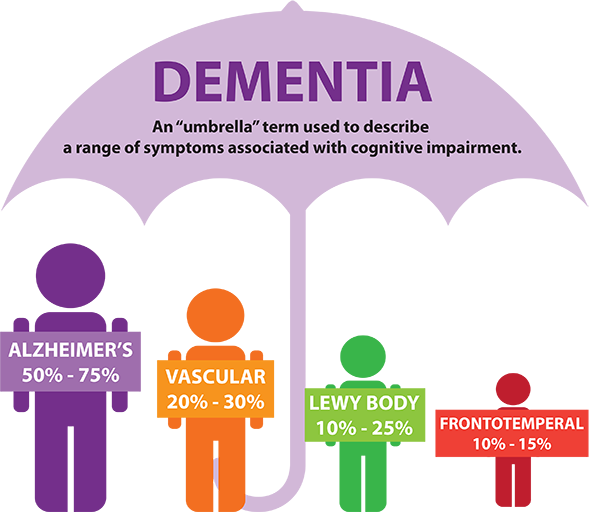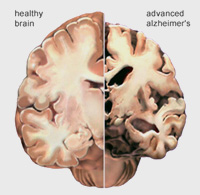The Difference between Alzheimer’s and Dementia
Dementia is a general term for a group of brain disorders. Alzheimer’s disease is the most common type of dementia, accounting for 50 to 70 percent of cases.
All types of dementia involve mental decline that:
- Occurs from a higher level (for example, the person didn’t always have a poor memory)
- Severe enough to interfere with usual activities and daily life
- Affects more than one of the following four core mental abilities:
- Short-term memory retention
- Language
- Visuospatial function (correct interpretation of visual cues)
- Executive function (problem solving, planning)


ABOUT ALZHEIMER'S DISEASE
Causes and Treatment
Alzheimer’s disease is a progressive, degenerative disease of the
brain that results in memory loss, impaired thinking, difficulty
speaking, and personality changes. The disease affects 1 in 10 individuals over the age of 65 and is the most common form of dementia.
The cause of Alzheimer’s disease is currently unknown. Some suspected causes include diseased genes or a genetic predisposition, abnormal protein build-up in the brain and environmental toxins.
Although no cure for Alzheimer’s disease is presently available, proper education, good planning, and support can ease the burdens on the patient and family.
10 Warning Signs You Should Know:
- Recent Memory Loss That Affects Job/Life Skills or daily activities
- Difficulty Performing Familiar Tasks
- Problems With Language
- Disorientation of Time and Place
- Poor or Decreased Judgment
- Problems with Abstract Thinking
- Misplacing Things
- Changes in Mood or Behavior
- Changes in Personality
- Loss of Initiative
Risk Reduction Factors
While there is no definitive cure for Alzheimer’s disease, research suggests that certain lifestyle modifications may help reduce the risk of developing this condition. Here are 10 evidence-based ways to potentially prevent Alzheimer’s:


